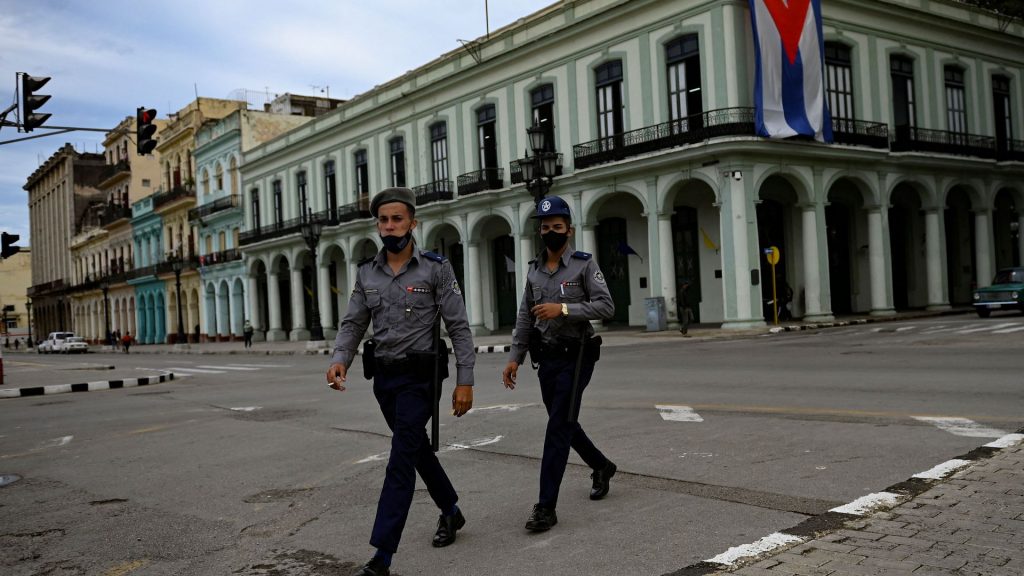For weeks, the activist group Archipiélago was preparing a demonstration on November 15 to protest the policies of Cuban president Miguel Díaz-Canel and his administration. In response, the Díaz-Canel government carried out a campaign of repression and intimidation, ultimately declaring the protest illegal and dissuading protesters from taking to the streets.
Archipiélago is composed of a wide range of activists and figures who are critical of the regime. Its call to action generated extensive media coverage, as well as the support of the right-wing opposition, including el Consejo para la Transición Democrática de Cuba (“the Council for the Democratic Transition of Cuba”). According to the organizers, the march was called “against violence, for the rights of all Cubans, the liberation of political prisoners and the resolution of differences through democratic and peaceful means.”
Although the organizers’ call did not incorporate a denunciation of the government’s economic and social policies — which were the fundamental driving force of the July 11 protests, together with the right to political expression — the protest would likely have drawn broad sectors of the population into the streets to express their dissatisfaction with the current situation in Cuba.
You might be interested in: November 15 March in Cuba: Against Government Repression, For a Revolutionary Solution to the Crisis
The first response of the government of Miguel Díaz Canel was to declare the demonstration illegal and denounce it as a “destabilizing action.” In the days leading up to the protest, the authorities ramped up harassment against activists who were likely to participate in the action, arresting several people. On November 14 and 15, dozens of people who expressed publicly that they would participate in the protest were “trapped” in their homes, prevented from leaving by state security forces or by groups of pro-regime demonstrators.
The most publicized case of harassment is that of playwright Yunior García, who had previously announced that he would carry out a solitary march on November 14 in defiance of the government’s orders. García was later forcibly detained in his home. Similar acts of direct intimidation were directed at other activists in the country. Meanwhile, the streets of Havana — where the largest demonstration was expected to take place — were filled with police and security forces.
The government’s aims were obvious: to discourage protesters from taking the streets and prevent a mobilization equal to or greater than the one that took place a little more than four months ago. At the same time, it wished to avoid the political cost of repressing such a march, which could quickly get beyond its control and have wide-reaching consequences internationally.
Díaz Canel’s government is betting that the reopening of tourism in Cuba will provide quick relief to the critical situation facing the island’s economy, which is hitting broad sectors of the population the hardest while the bureaucratic and military caste enjoys immense privileges. However, it is evident that social discontent on the island, both in response to the government’s economic policies and the lack of democratic freedoms, is far from dissipating. On the contrary, the scene is set for greater political tension or social explosions such as those that began on July 11 this year.
The Right Wing Takes Advantage of the Situation in the Face of Government Repression
As was already seen earlier this year in July, the pro-imperialist right wing seeks to take advantage of the existing discontent. The action planned for November 15 was taken up by these sectors, who identify with an openly restorationist and pro-capitalist agenda, such as the Council for the Democratic Transition of Cuba.
It is worth mentioning that the program of the Council openly aims to convert the island into a “market economy” and to grant compensation for the expropriations carried out after the triumph of the Cuban Revolution. These sectors also promoted demonstrations this November 15 in different cities around the world. They hypocritically and cynically demand “freedom” and “democracy,” manipulating the situation in favor of capitalist restoration on the island and aligning themselves with the greatest hopes of imperialism and the region’s bourgeoisie.
For its part, the Díaz Canel government and the Communist Party of Cuba (PCC), stating that the hand of imperialism is behind the mobilizations that took place last year, maintains the repressive policy it carried out in July, when it imprisoned hundreds of demonstrators. Many of those arrested were left-wing activists critical of the political regime, including young members of the PCC. As protesters called for freedom of political expression, the regime doubled down on its policy of the one-party regime. Furthermore, it advanced with further economic measures to advance capitalist restoration on the island, measures which ultimately punish the working class and poor people of Cuba.
But the government took a further step in response to the call for a protest on November 15 — it prohibited the fundamental right to protest, outlawing the mobilization called by Archipiélago and mounting acts of repression against the organizers.
We unequivocally repudiate the prohibition of protest and the other repressive actions of the regime. At the same time, we do not give political support to the organizers or their call, mirroring the position taken by socialist militants inside Cuba as we have republished here and here.
The Solution to Cuba’s Crisis Lies in the Hands of the Working Class and the People
Cuba requires a policy that is independent of the government as well as the right-wing opposition and imperialism. That implies a program against the imperialist blockade and that takes up the demands of the broad masses, such as a general wage increase, price control by the people, and an end to the privileges of the ruling caste.
We reject both the government’s authoritarianism and its claims that the discontent lacks a real basis and is completely due to imperialist and right-wing manipulation. Undoubtedly such interference exists, but that does not justify the suppression of legitimate social demands.
We repudiate the repressive policies of the government. We defend the right of the working class to organize itself politically independently of the state and its agencies, whether it is in protests or in trade unions. We demand the freedom of assembly and the freedom of the press, as well as the right to protest and strike.
First published in Spanish on November 15 in La Izquierda Diario.
Translation by Madeleine Freeman











